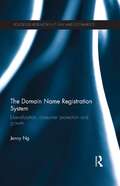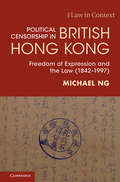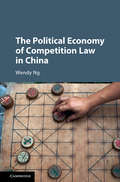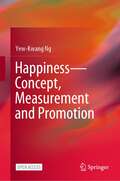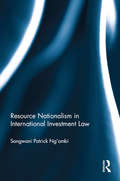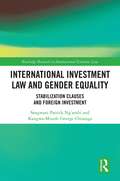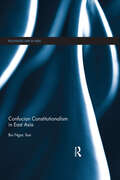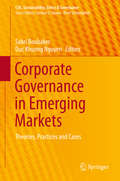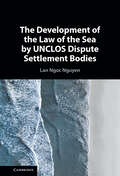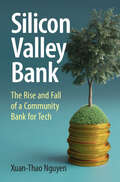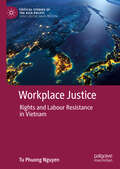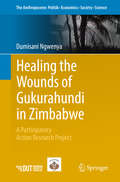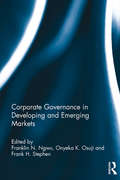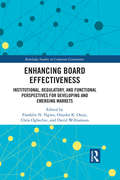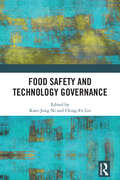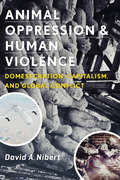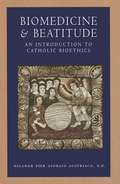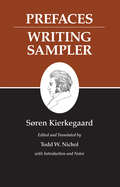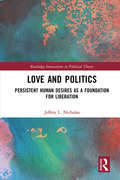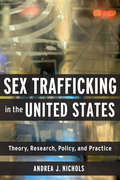- Table View
- List View
The Domain Name Registration System: Liberalisation, Consumer Protection and Growth (Routledge Research in Information Technology and E-Commerce Law)
by Jenny NgThis book offers a comparative analysis of the domain name registration systems utililsed in Australia and the United Kingdom. Taking an international perspective, the author analyses the global trends and dynamics of the domain name registration systems and explores the advantages and disadvantages of restrictive and less restrictive systems by addressing issues of consumer protection. The book examines the regulatory frameworks in the restrictive and unrestrictive registration systems and considers recent developments in this area. Jenny Ng also examines the legal and economic implications of these regulatory frameworks, drawing upon economic theory, regulatory and systems theory as well as applying rigorous legal analysis. In doing so, this work proposes ways in which such systems could be better designed to reflect the needs of the specific circumstances in individual jurisdictions. The Domain Name Registration System will be of particular interest to academics and students of IT law and e-commerce.
Political Censorship in British Hong Kong: Freedom of Expression and the Law (1842–1997) (Law in Context)
by Michael NgDrawing on archival materials, Michael Ng challenges the widely accepted narrative that freedom of expression in Hong Kong is a legacy of British rule of law. Demonstrating that the media and schools were pervasively censored for much of the colonial period and only liberated at a very late stage of British rule, this book complicates our understanding of how Hong Kong came to be a city that championed free speech by the late 1990s. With extensive use of primary sources, the free press, freedom of speech and judicial independence are all revealed to be products of Britain's China strategy. Ng shows that, from the nineteenth to the twentieth century, Hong Kong's legal history was deeply affected by China's relations with world powers. Demonstrating that Hong Kong's freedoms drifted along waves of change in global politics, this book offers a new perspective on the British legal regime in Hong Kong.
The Political Economy of Competition Law in China
by Wendy NgThe Political Economy of Competition Law in China provides a unique perspective of China's competition law that is situated within its legal, institutional, economic, and political contexts. Adopting a framework that focuses on key stakeholders and the relevant governance and policy environment, and drawing upon stakeholder interviews, case studies, and doctrinal analysis, this book examines China's anti-monopoly law in the context of the political economy from which it emerged and in which it is now enforced. It explains the legal and economic reasoning used by Chinese competition authorities in interpreting and applying the anti-monopoly law, and offers valuable and novel insights into the processes and dynamics of law- and decision-making under that law. This book will interest scholars of competition law and professionals advising clients that operate in China, as well as scholars of Chinese law, Asian law, comparative law, and political and social science.
Happiness—Concept, Measurement and Promotion
by Yew-Kwang NgThis open access book defines happiness intuitively and explores several common conceptual mistakes with regard to happiness. It then moves on to address topical issues including, but not limited to, whether money can buy you happiness, why happiness is ultimately the only thing of intrinsic value, and the various factors important for happiness. It also presents a more reliable and interpersonally comparable method for measuring happiness and discusses twelve factors, from A to L, that are crucial for individual happiness: attitude, balance, confidence, dignity, engagement, family/friends, gratitude, health, ideals, joyfulness, kindness and love. Further, it examines important public policy considerations, taking into account recent advances in economics, the environmental sciences, and happiness studies. Novel issues discussed include: an environmentally responsible happy nation index to supplement GDP, the East Asian happiness gap, a case for stimulating pleasure centres of the brain, and an argument for higher public spending.
Resource Nationalism in International Investment Law
by Sangwani Patrick Ng’ambiForeign direct investment in the natural resource industries is fostered through the signing of concession agreements between the host State and the investor. However, such concessions are susceptible to alteration by the host State, meaning that many investors now require the insertion of stabilization clauses. These are provisions that require the host State to agree that they will not take any administrative or legislative action that would adversely affect the rights of the investor. Arguing that it is necessary to have some form of flexibility in concession agreements while still offering protection of the legitimate expectations of the investor, Resource Nationalism in International Investment Law proposes the insertion of renegotiation clauses in order to foster flexible relationships between the investor and the host State. Such clauses bind the parties to renegotiate the terms of the contract, in good faith, when prevailing circumstances change. However these clauses can also prove problematic for both State and investor due to their rigidity. Using Zambia as a case study, it highlights the limitations of the efficient breach theory to emphasise the need for contractual flexibility.
International Investment Law and Gender Equality: Stabilization Clauses and Foreign Investment (Routledge Research in International Economic Law)
by Sangwani Patrick Ng’ambi Kangwa-Musole George ChisangaThis book analyses the impact that stabilization clauses have on the development of human rights and gender laws in resource rich nations.Given the fact that stabilization clauses freeze the law for as long as the contract subsists there has been debate on the negative impact stabilization clauses have on the progressive development of human rights in the host State. Firstly, the book examines the mechanisms investors utilise in protecting themselves from host State prerogatives. It then explores the theoretical basis on which stabilization clauses are applied and upheld by arbitral tribunals, and assesses how they can be drafted in a way that protects human rights, particularly in relation to gender discrimination, without forcing the resource rich nations to lose momentum in attracting foreign direct investment. Using Zambia and the Gender Equity and Equality Act of 2015 as a case study, the book explores the compatibility of the legislation with the stabilization clauses contained in the country’s Development Agreements.The book will be of interest to practitioners, scholars and students of international investment law, human rights law and contract law.
Unmasked: Inside Antifa's Radical Plan to Destroy Democracy
by Andy NgoA journalist who's been attacked by Antifa writes a deeply researched and reported account of the group's history and tactics. When Andy Ngo was attacked in the streets by Antifa in the summer of 2019, most people assumed it was an isolated incident. But those who'd been following Ngo's reporting in outlets like the New York Post and Quillette knew that the attack was only the latest in a long line of crimes perpetrated by Antifa. In Unmasked, Andy Ngo tells the story of this violent extremist movement from the very beginning. He includes interviews with former followers of the group, people who've been attacked by them, and incorporates stories from his own life. This book contains a trove of documents obtained by the author, published for the first time ever. <P><P><b>A New York Times Bestseller</b>
Confucian Constitutionalism in East Asia (Routledge Law in Asia)
by Bui Ngoc SonWestern liberal constitutionalism has expanded recently, with, in East Asia, the constitutional systems of Japan, South Korea and Taiwan based on Western principles, and with even the socialist polities of China and Vietnam having some regard to such principles. Despite the alleged universal applicability of Western constitutionalism, however, the success of any constitutional system depends in part on the cultural values, customs and traditions of the country into which the constitutional system is planted. This book explains how the values, customs and traditions of East Asian countries are Confucian, and discusses how this is relevant to constitutional practice in the region. The book outlines how constitutionalism has developed in East Asia over a long period, considers different scholarly work on the ease or difficulty of integrating Western constitutionalism into countries with a Confucian outlook, and examines the prospects for such integration going forward. Throughout, the book covers detailed aspects of Confucianism and the workings of constitutions in practice.
Corporate Governance in Emerging Markets: Theories, Practices and Cases (CSR, Sustainability, Ethics & Governance)
by Duc Khuong Nguyen Sabri BoubakerThis book fills the gap between theories and practices of corporate governance in emerging markets by providing the reader with an in-depth understanding of governance mechanisms, practices and cases in these markets. It is an invaluable resource not only for academic researchers and graduate students in law, economics, management and finance but also for people practicing governance such as lawmakers, policymakers and international organizations promoting best governance practices in emerging countries. Investors can benefit from this book to better understand of these markets and to make judicious investment decisions.
The Development of the Law of the Sea by UNCLOS Dispute Settlement Bodies
by Lan Ngoc NguyenThis is the first study to provide both a systematic assessment of the ways by which the dispute settlement bodies of the United Convention on the Law of the Sea (UNCLOS) contribute to the development of the law of the sea and an exposition of the factors that explain such contribution. The book analyses UNCLOS dispute settlement bodies' decisions and the legal reasoning in key areas of the law of the sea. It further examines the factors that impact the decision-making process of UNCLOS tribunals to explain the parameters within which UNCLOS tribunals operate and how this impacts their ability and willingness to develop the law. The book provides a unique reference point for lecturers, researchers and students of international law, particularly law of the sea, as well as practitioners and government advisors who wish to gain comprehensive insights into the functioning and the role of the UNCLOS dispute settlement system.
Silicon Valley Bank: The Rise and Fall of a Community Bank for Tech
by null Xuan-Thao NguyenThis book provides a first-hand account of the founding, ascent, and dissolution of Silicon Valley Bank (SVB), a tech community bank founded in 1982 with US$5 million that became the nation's 13th largest bank and tech industry's lender and bank. In this pathbreaking work, which challenges conventional understanding of risky tech lending by showing how an independent community bank became the go-to bank for the tech industry in the United States, Xuan-Thao Nguyen includes interviews with key players, ranging from the original founders and early employees to the current CEO of SVB. Chapters explore how the relationship between the venture capital (VC) industry and SVB transformed the way commercial banks comply with banking regulators while lending and nurturing young tech clients. The book demonstrates why the relationships between investors, start-ups, bankers, lenders, experts, lawyers, regulators, and community leaders are key ingredients for ongoing innovation in the tech industry. The book concludes with the sobering dissection of SVB's sudden death by $142 billion cuts inflicted by tech bros, social media, and the Federal Reserve Bank's successive interest rate hikes to squash the overheated economy.
Workplace Justice: Rights and Labour Resistance in Vietnam (Critical Studies of the Asia-Pacific)
by Tu Phuong NguyenThis book develops an understanding of workplace justice and labour rights in Vietnam from factory workers’ voices and their resistance against abuse and exploitation. Through interviews with workers and a close analysis of their letters and petitions to the unions and state authorities, Nguyen illuminates how workers’ resistance is enabled and stifled by the legal and political systems that are supposed to protect their rights and benefits. Their calls for justice reflect socialist ideology and widely held norms within society, as well as ideals and values embedded in labour law. The book demonstrates how state law brings about social change through shaping workers’ expectations and increasing consciousness of rights and justice. This book will be of interest to scholars of law, politics and society, and scholars, students and practitioners interested in labour rights in developing countries.
Healing the Wounds of Gukurahundi in Zimbabwe: A Participatory Action Research Project (The Anthropocene: Politik—Economics—Society—Science #19)
by Dumisani NgwenyaThis book is based on a participatory action research project carried out with a group of former Zimbabwe People's revolutionary Army (ZPRA) which was the armed wing of the Zimbabwe African People's Union (ZAPU) which was led by the late Joshua Nkomo. ZPRA was the primary target of Gukurahundi, a pogrom by the Mugabe government which left an estimated 20 000 civilians dead and countless others tortured in the early 1980s in Matebeleland, Zimbabwe. It has been almost 30 years since the violence ended, but there has never been an official healing and reconciliation programme or truth commission into the atrocities. The government chose the path of amnesia by granting a blanket amnesty to all involved. The regime has enforced a culture of silence over the event through repression and intimidation. The book is a culmination of a two year journey, by the group and the author, of an exploration of group-based self-healing approaches to the pain caused by the violence of Gukurahundi.
Corporate Governance in Developing and Emerging Markets
by Franklin N. Ngwu Onyeka K. Osuji Frank H. StephenThroughout the world, the Anglo-American model of corporate governance tends to prevail – but no two countries are identical. Governance outcomes in developing and emerging economies often deviate from what theory predicts, due to a wide range of factors. Using insights from New Institutional Economics, Corporate Governance in Developing and Emerging Markets aims to explain the different issues and cultural and legal factors at play, and put forward an alternative governance framework for these economies. Structured in three parts, this text investigates different models of corporate governance; it explores the realities of corporate governance in ten nations, including the ‘BRICS’ (Brazil, Russia, India, China and South Africa) and ‘MINT’ (Mexico, Indonesia, Nigeria and Turkey) countries; and then considers corporate governance reform. This interdisciplinary text will be a valuable tool for students of corporate governance across Business, Economics and Law; and an equally useful resource for anyone working in or carrying out research in this area.
Enhancing Board Effectiveness: Institutional, Regulatory and Functional Perspectives for Developing and Emerging Markets (Routledge Studies in Corporate Governance)
by Franklin N. Ngwu Onyeka Osuji Chris Ogbechie David WilliamsonEnhancing Board Effectiveness seeks to examine the conceptualization and role of the board in a variety of contexts and articulate solutions for improving the effectiveness of the board, especially in developing and emerging markets. Enhancing Board Effectiveness with therefore address the following central questions: To what extent is the concept and role of the board evolving? What rights, powers, responsibilities and other contemporary and historical experiences can enhance the effectiveness of the board, especially in the particular contexts of developing and emerging markets? What socio-economic, political, regulatory and institutional factors/actors influence the effectiveness of the board and how can the policies and practices of such actors exert such influences? In what ways can a reconstructed concept of the board serve as a tool for theoretical, analytical, regulatory and pragmatic assessment of its effectiveness? In examining this issues, Enhancing Board Effectiveness will investigate theoretical, socio-economic, historical, empirical, regulatory, comparative and inter-disciplinary approaches. Academics in the relevant fields of accounting, behavioural psychology/economics, development studies, financial regulation, law and management/organizational studies, political economy and, public administration will find this book of high interest.
Food Safety and Technology Governance
by Kuei-Jung Ni Ching-Fu LinRecent advances in agri-food technology have brought about increasing complexity and emerging challenges to food safety regulation and governance, with many countries greatly divided in their regulatory approaches. As more advanced CRISPR based gene-editing technologies, and novel foods such as cloned animal products, non-traditional plants, nanofood, and plant-based meat are rapidly being developed, debates arise as to whether the existing models of governance require revision to ensure consumer safety. Of equal importance is the extensive use of pesticides, additives, and animal drugs which raise concerns over the methods and approaches of government approval and phasing out of potentially risk-causing chemicals. Heightened public criticism of food safety and technology poses a significant challenge to governments around the world, which struggle to strike a proper balance between technocracy- and democracy-oriented risk governance models. Drawing on expertise from the United States, European Union, Japan, China, Korea, Association of South East Asian Nations, Malaysia, and Taiwan, this book explores existing and emerging issues of food law and policy in the context of technology governance to offer an overarching framework for the interaction between food regulation and technology. It will be essential reading for academics, students and practitioners with an interest in food law and policy, agricultural law and policy and food safety and nutrition studies.
Animal Oppression and Human Violence: Domesecration, Capitalism, and Global Conflict (Critical Perspectives on Animals: Theory, Culture, Science, and Law)
by David NibertJared Diamond and other leading scholars have argued that the domestication of animals for food, labor, and tools of war has advanced the development of human society. But by comparing practices of animal exploitation for food and resources in different societies over time, David A. Nibert reaches a strikingly different conclusion. He finds in the domestication of animals, which he renames "domesecration," a perversion of human ethics, the development of large-scale acts of violence, disastrous patterns of destruction, and growth-curbing epidemics of infectious disease. <P><P>Nibert centers his study on nomadic pastoralism and the development of commercial ranching, a practice that has been largely controlled by elite groups and expanded with the rise of capitalism. Beginning with the pastoral societies of the Eurasian steppe and continuing through to the exportation of Western, meat-centered eating habits throughout today's world, Nibert connects the domesecration of animals to violence, invasion, extermination, displacement, enslavement, repression, pandemic chronic disease, and hunger. In his view, conquest and subjugation were the results of the need to appropriate land and water to maintain large groups of animals, and the gross amassing of military power has its roots in the economic benefits of the exploitation, exchange, and sale of animals. Deadly zoonotic diseases, Nibert shows, have accompanied violent developments throughout history, laying waste to whole cities, societies, and civilizations. His most powerful insight situates the domesecration of animals as a precondition for the oppression of human populations, particularly indigenous peoples, an injustice impossible to rectify while the material interests of the elite are inextricably linked to the exploitation of animals. Nibert links domesecration to some of the most critical issues facing the world today, including the depletion of fresh water, topsoil, and oil reserves; global warming; and world hunger, and he reviews the U.S. government's military response to the inevitable crises of an overheated, hungry, resource-depleted world. Most animal-advocacy campaigns reinforce current oppressive practices, Nibert argues. Instead, he suggests reforms that challenge the legitimacy of both domesecration and capitalism.
Biomedicine And Beatitude: An Introduction to Catholic Bioethics
by Nicanor Pier Giorgio Austriaco<P>How are the patient, the physician, the nurse, and the scientist called to grow in holiness in their particular vocations? This introductory text, written from within the Catholic moral tradition, narrates a bioethics that emphasises the pursuit of beatitude in the lives of those who are confronted by moral questions raised by biomedicine and the other life sciences. <P>The Catholic moral vision that informs this volume is rooted in the moral life described by the Lord Jesus Christ in his Sermon on the Mount. As Pope John Paul II taught in his moral encyclical, Veritatis splendour, we imitate Christ by seeking, with God's grace, to perfect ourselves through our actions and the virtues they engender. In this way, Catholic bioethics differs from other contemporary approaches to bioethics that focus on either the outcomes of human acts or the procedures that protect the autonomy of the human agent. <P>Besides ethical questions raised at the beginning and the end of life, Nicanor Austriaco, O.P., discusses the ethics of the clinical encounter, human procreation, organ donation and transplantation, and biomedical research. Finally, the text discusses the realities faced by citizens of faith living in a free and democratic society that is at the same time postmodern, secular, and liberal.
Kierkegaard's Writings, IX
by Todd W. Nichol Søren KierkegaardPrefaces was the last of four books by Søren Kierkegaard to appear within two weeks in June 1844. Three Upbuilding Discourses and Philosophical Fragments were published first, followed by The Concept of Anxiety and its companion--published on the same day--the comically ironic Prefaces. Presented as a set of prefaces without a book to follow, this work is a satire on literary life in nineteenth-century Copenhagen, a lampoon of Danish Hegelianism, and a prefiguring of Kierkegaard's final collision with Danish Christendom. Shortly after publishing Prefaces, Kierkegaard began to prepare Writing Sampler as a sequel. Writing Sampler considers the same themes taken up in Prefaces but in yet a more ironical and satirical vein. Although Writing Sampler remained unpublished during his lifetime, it is presented here as Kierkegaard originally envisioned it, in the company of Prefaces.
The Constitution of the Commonwealth of Australia
by Nicholas Aroney Peter Gerangelos Sarah Murray James Stellios Nicholas Aroney Peter Gerangelos Sarah MurrayThe Constitution of the Commonwealth of Australia examines the body of constitutional jurisprudence in an original and rigorous yet accessible way. It begins by exploring the historical and intellectual context of ideas surrounding the Constitution's inception, and closely examines its text, structure, principles and purposes in that light. The book then unpacks and critically analyses the High Court's interpretation of the Constitution in a manner that follows the Constitution's own logic and method of organisation. Each topic is defined through detailed reference to the existing case law, which is set out historically to facilitate an appreciation of the progressive development of constitutional doctrine since the Constitution came into force in 1901. The Constitution of the Commonwealth of Australia provides an engaging and distinctive treatment of this fundamental area of law. It is an excellent book for anyone seeking to understand the significance and interpretation of the Constitution.
Love and Politics: Persistent Human Desires as a Foundation for Liberation (Routledge Innovations in Political Theory)
by Jeffery L. NicholasIn, Love and Politics Jeffery L. Nicholas argues that Eros is the final rejection of an alienated life, in which humans are prevented from developing their human powers; Eros, in contrast, is an overflowing of acting into new realities and new beauties, a world in which human beings extend their powers and senses. Nicholas uniquely interprets Alasdair MacIntyre’s Revolutionary Aristotelianism as a response to alienation defined as the divorce of fact from value. However, this account cannot address alienation in the form of the oppression of women or people of color. Importantly, it fails to acknowledge the domination of nature that blackens the heart of alienated life. Alienation must be seen as a separation of the human from nature. Nicholas turns to Aristotle, first, to uncover the way his philosophy embodies a divorce of human from nature, then to reconstruct the essential elements of Aristotle’s metaphysics to defend a philosophical anthropology based on Eros. Love and Politics: Persistent Human Desires as a Foundation for Liberation presents a critical theory that synthesizes MacIntyre’s Revolutionary Aristotelianism, Frankfurt School Critical Theory, and Social Reproduction Theory. It will be of great interest to political theorists and philosophers.
Christmas Conversation Piece
by Bret Nicholaus Paul LowrieWhat one Christmas tradition would you never want to give up? If you could spend Christmas anywhere in the world, where would you most want to be? If you could have visited the Christ child just as the Three Kings did, what would you have brought as a gift? You've been chosen to host a sensational Christmas celebration on TV: What three guests would you choose to make it the best Christmas special ever? The Christmas Conversation Pieceoffers these and many other questions to pose and ponder during a season of both deep reflection and unabashed merriment. This charming volume--the perfect stocking stuffer--will provide you, your family, and your friends with twelve days of surprising and amusing Yuletide questions. Who would you most like to meet under the mistletoe? Your answer just may change by Christmas Eve!
Have You Ever...: Questions About You, Your Friends, and Your World
by Bret Nicholaus Paul LowrieHave you ever met a professional musician? Have you ever flown in something other than an airplane? Have you ever blown a tire while driving? Have you ever gone on a blind date? Have you ever dreamed in color? Masters of fun and friendly communication, Bret Nicholaus and Paul Lowrie are back with an intriguing book of questions sure to get everyone talking! Have You Ever . . . is a great way to start entertaining conversations with people you've just met or friends you've known your whole life. A unique book filled with questions that will help you connect with others--new acquaintances, old friends, children and teenagers, all the members of your family, Have You Ever . . . will leave you shaking with laughter, awash in forgotten memories, and marveling at the things you never knew about your friends and family! Have you ever had an opportunity this easy to start fantastic conversations? From the Hardcover edition.
Social Innovation
by Alex Nicholls Alex MurdockFocusing on social innovation broadly conceived in the context of social entrepreneurship and social enterprise in their global context this book is organised to address three of the most important themes in social innovation: strategies and logics, performance measurement and governance, and finally, sustainability and the environment.
Sex Trafficking in the United States: Theory, Research, Policy, and Practice
by Andrea NicholsSex Trafficking in the United States is a unique exploration of the underlying dynamics of sex trafficking. This comprehensive volume examines the common risk factors for those who become victims, and the barriers they face when they try to leave. It also looks at how and why sex traffickers enter the industry. A chapter on buyers presents what we know about their motivations, the prevalence of bought sex, and criminal justice policies that target them. Sex Trafficking in the United States describes how the justice system, activists, and individuals can engage in advocating for victims of sex trafficking. It also offers recommendations for practice and policy and suggestions for cultural change.Andrea J. Nichols approaches sex-trafficking-related theories, research, policies, and practice from neoliberal, abolitionist, feminist, criminological, and sociological perspectives. She confronts competing views of the relationship between pornography, prostitution, and sex trafficking, as well as the contribution of weak social institutions and safety nets to the spread of sex trafficking. She also explores the link between identity-based oppression, societal marginalization, and the risk of victimization. She clearly accounts for the role of race, ethnicity, immigrant status, LGBTQ identities, age, sex, and intellectual disability in heightening the risk of trafficking and how social services and the criminal justice and healthcare systems can best respond. This textbook is essential for understanding the mechanics of a pervasive industry and curbing its spread among at-risk populations.Please visit our supplemental materials page (https://cup.columbia.edu/extras/supplement/sex-trafficking-united-states) to find teaching aids, including PowerPoints, access to a test bank, and a sample syllabus.
